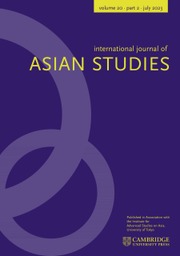MEDIEVAL JAPANESE CONSTRUCTIONS OF PEACE AND LIBERTY: MUEN, KUGAI, AND RAKU
Published online by Cambridge University Press: 17 January 2007
Abstract
The terms muen, kugai, and raku appear in medieval documents and invoke the idea of places which exist outside the reach of the secular power, such as shrines, temples, bridges and markets. They can also be extended to refer to people who are without worldly ties. Such places highlight the limitations that applied to political authority in medieval Japan, and they were characterized by such “freedoms” as limitations on the right of entry, exemptions from rents, taxes and corvée labor, rights of free passage, asylum from conflict and the civil law, non-recognition of serfdom or slavery, non-application of collective punishment, and authority based on seniority. The terms themselves defy clear individual definition. All three can be traced to Buddhist texts, though they were appropriated in the medieval period to secular use. Muen refers to being “unattached” (that is, without karmic ties), kugai to the realm of temples (the abodes of those who have cut secular ties), and raku to the ideal realm (or “paradise”). Though these terms were associated with liberty in the medieval period, they lost their positive connotations once the country was unified at the end of the sixteenth century.
- Type
- Articles
- Information
- Copyright
- Cambridge University Press 2007
Footnotes
- 1
- Cited by


